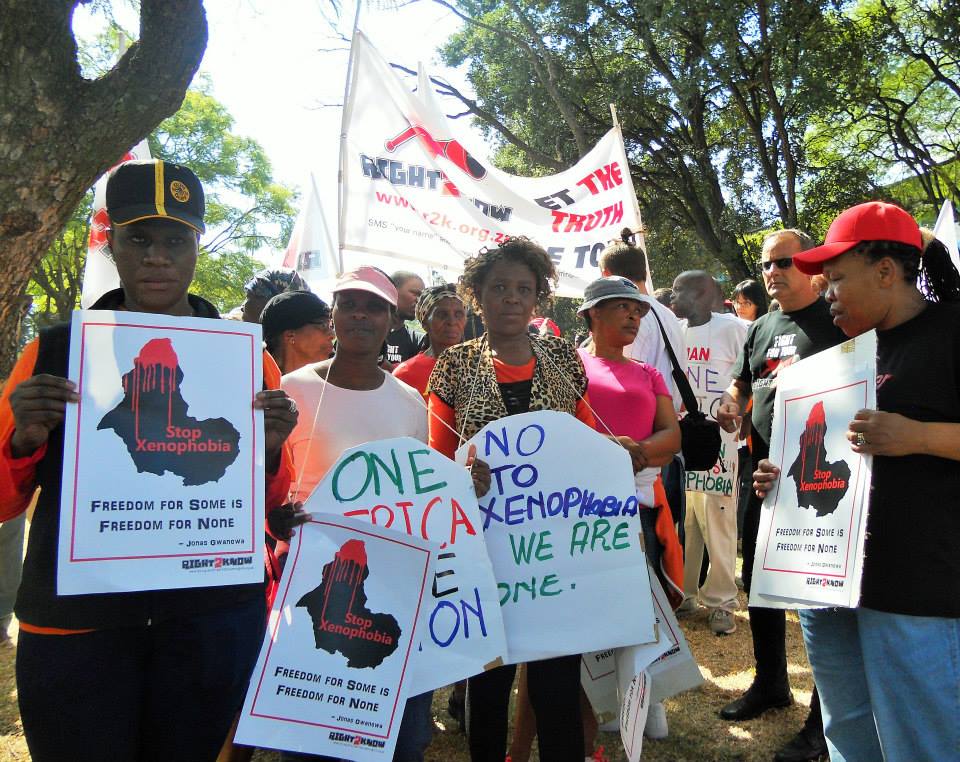Right2Know Western Cape response to allegations from sections of SACP/SANCO Cape Metro region
Yesterday, sections of the ANC, SACP and SANCO in the Cape Metro issued a public statement announcing that they will be marching to Parliament later this morning to show their support for the Secrecy Bill.
While this in itself is not particularly surprising given past statements of support for the Bill from both the ANC and SACP national leaderships, it is supremely ironic that some ANC, SACP and SANCO supporters who belong to organisations with a proud history of fighting against draconian government control of information before 1994 are now marching to defend the indefensible.
In this respect, it is important to note that despite the statement being issued in the name of the ‘ANC Alliance’, COSATU – the ANC’s most mass-based ally – is not, as far as the Right2Know Campaign is aware, supporting or participating in the march. As is well known, COSATU has consistently declared its opposition to the Bill in its current form and indicated that it shares many of the Right2Know’s concerns about the Bill. Further, there is no evidence that these Cape Metro formations of the ANC, SACP and SANCO are speaking on behalf of their respective provincial or national bodies. What is clear is that the statement comes from ANC-SACP-SANCO members/supporters aligned with the securocrats.
Not surprisingly then, virtually the entire statement is dedicated to attacking the Right2Know Campaign. It is almost as if the march is not so much about the Bill but about protesting against the Right2Know Campaign (which is scheduled to be in Parliament presenting its objections to the Bill before the National Council of Provinces at 9am on Friday morning). The statement makes a number of allegations against the Right2Know, allegations which are completely unfounded and require our immediate response:
ALLEGATION No. 1: The R2K is “dominated by foreign-sponsored NGO’s and western-owned media agencies”.
The Right2Know campaign is a popular civil society campaign rooted in organisations of the poor and working class. The campaign is made up of a wide range of people that come from across South Africa’s political, social and economic landscape – some who have voted for the ANC, some who vote for other parties, and some who choose not to vote at all. The elected leadership of the campaign in the Western Cape is dominated by community-based activists; only 5 of our 15 provincial leaders are employed by funded NGOs.
Regarding funding, the Right2Know does receive funding from South African and international donors. Our finances are handed with utmost transparency and integrity and all relevant information about R2K donors is available publicly – for example, on our website. Unfortunately, the same cannot be said of the ANC and the SACP.
While the ANC in government has constantly refused to pass legislation compelling political parties to reveal their sources of funding, the SACP has remained silent on the regular popular calls for all political parties to be transparent about their funding sources.
It also worth noting that the R2K’s funding for a year is less than half the money the Ministry of State Security spent in a few days on its recent multi-media advertising campaign in support of the Secrecy Bill.
We must also note that rather than promoting the vision of active citizens in a participatory democracy contained in our Constitution and many ANC policy documents, the SACP has, in recent times, been making a habit of demonising organised citizens and effectively labelling them as the ‘enemy’ (under the pejorative rhetorical guise of ‘liberalism’).
Today we are accused of being “dominated by foreign-sponsored NGOs”. It is not a great leap to imagine that we will soon be accused of being “agents of a foreign state” and find ourselves locked up in South African prisons under the provisions of the Secrecy Bill or General Intelligence Laws Amendment Bill – both currently before Parliament.
ALLEGATION No. 2: The Campaign has “links with often foreign owned media houses” and is “misleading the public with their supposition that the media is interest-free.”
It is true that the Right2Know has a common interest with sections of the mainstream media in stopping the draconian Secrecy Bill. However we are also committed to campaigning for the transformation of the media to ensure that it can truly serve the information needs of all South Africans.
The campaign has identified that the commercialisation of the media and the high levels of concentration in media ownership as threats to the free flow of information. We have committed ourselves to campaigning for a diverse media that is free of government control includes large sections of public and community media. To this end we are campaigning to limit the dominance of media monopolies and demand that government provide adequate public funding for quality small commercial, public, and non-profit media.
It is in fact the government that has implemented policies that have resulted in the consolidation of private media monopolies, under-funding of the SABC and MDDA, and the commercialisation of public and community broadcasting. It is the ANC – the majority party in Parliament and manager of the state – that has failed to diversify the South African media and now wishes to use this legitimate concern as a pretext to advance calls for a Media Appeals Tribunal.
ALLEGATION No. 3: The campaign “create[s] hysteria based on unfounded claims that the [Secrecy] Bill will conceal corruption [and] that investigative journalism will be suppressed…”
In this allegation, the drafters reveal the exent to which they are completely out of touch with the debates around the Secrecy Bill. The Bill’s extraordinarily broad provisions for state secrecy are well-documented – indeed, they have been the subject of 2400 pages of Parliamentary submissions in the past month alone. Our concerns are easily understood to anyone who has studied the the far-reaching and half-heartedly regulated powers which the Bill would grant to government officials to surpress information – including “economic, scientific and technological secrets” – and target those who would expose such information with prison sentences ranging from five to 25 years. (Read the R2K submission on the Secrecy Bill to the NCOP.)
These provisions go far beyond what is necessary to protect national security, and can be viewed in the broader context of a rising securocratic elite within governmnet. These provisions ensure that if passed in its current form the Bill will create an environment in which democratic spaces may be closed off, and corruption and injustice may flourish. They are provisions which threaten to silence those on the front-line of social justice, including whistleblowers, activists and investigative journalists – this is the reason that organised labour, social movements, media organisations, and thousands of ordinary people rom across the country, continue to oppose the Bill.
In conclusion, we must stress that that the Right2Know is non-partisan and we will not let a small group of ANC/SACP/SANCO members who have aligned themselves with the spies and securocrats undermine R2K and what the campaign is struggling for.
The Right2Know Campaign is inspired by the words of Mahatma Gandhi who said: “First they ignore you, then they laugh at you, then they fight you, then you win.”
As far as we are aware, this is the first time that any component of the ANC has marched to Parliament in opposition to a campaign that has popular support from across all sections of our society, including from significant parts of the Alliance itself. We can only imagine it will not be the last.




